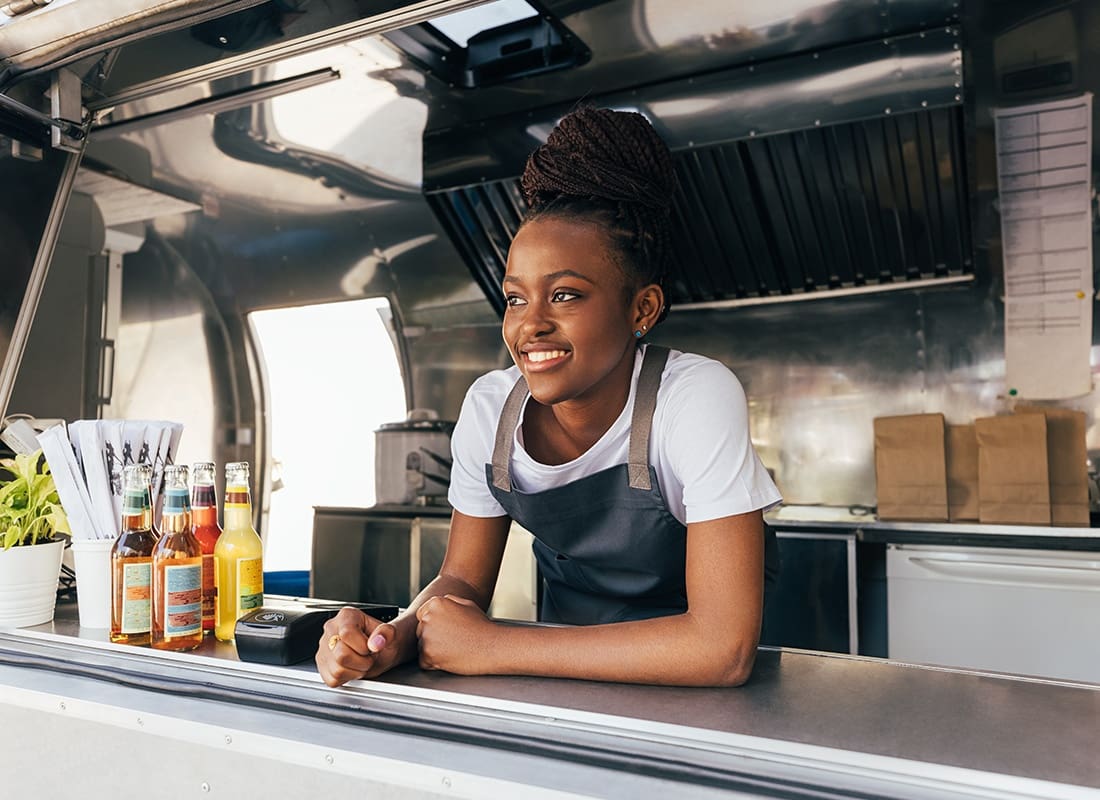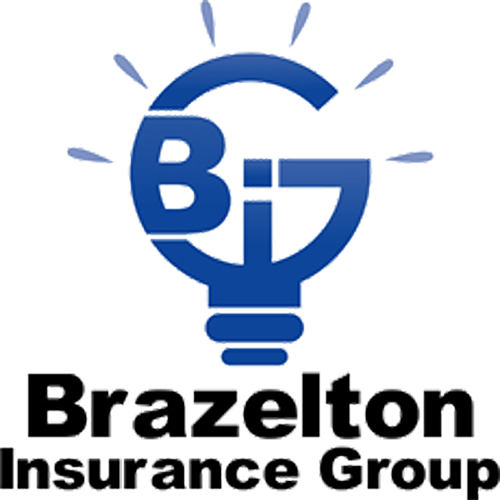
While food trucks are free to travel to different locations to serve food, food truck insurance helps cover your risks while on the move.
Your food truck is still a vehicle.
Unlike a traditional restaurant that has a building to house its kitchen, your business is based on your food truck moving from location to location. Since you’re using the food truck for commercial purposes, it most likely won’t be covered under any personal auto insurance you may have. For that reason, you’ll want business auto insurance as part of your food truck insurance plan. This coverage can help protect you in case your food truck is involved in an accident. For example, it typically covers things like damages and medical costs that you’re liable for. Some policies can also cover events like vehicle theft and weather damage. And, if you add physical damage coverage, it can help protect any equipment or appliances that are permanently affixed to your food truck.
Traveling makes you unique and puts you at risk.
One of the great things about having a food truck is you aren’t tied down to a single area like a traditional restaurant. You can travel to festivals and different cities to reach a wider variety of customers. However, because you travel from place to place, standard commercial property insurance probably won’t provide all the protection you need. Since business auto insurance only covers your vehicle, you’ll want to consider inland marine insurance to protect the contents of your food truck. This policy is important to your food truck insurance plan since it provides coverage for your property while it’s in transit between locations. In other words, if it gets damaged by a covered event, you may be protected from a major loss. Here are some of the types of food trucks that may benefit from this type of policy:
- Catering Trucks
- Concession Trucks
- Ice Cream Trucks
- Mobile Food Trucks
- Vending Trucks

Your business is mobile and will likely travel from location to location for various jobs. If your truck is involved in a collision, you risk not just your ability to move your business where it needs to be but also the ability to operate at all. In addition to collisions, the truck is also at risk for theft, fire, vehicle breakdown, and electrical hazards.
Regardless of the size of your truck or your operation, personal auto insurance likely will not be enough. Once you operate your vehicle for commercial purposes, a business auto policy is necessary. Other factors, including the type of foods and beverages you’re serving as well as the equipment and property inside the truck, will also need to be considered.
In the event of a covered loss, most policies include coverage for the income you cannot collect. For example, if your truck is stolen or damaged and you can’t run your business, what will you do? Other concerns, such as supply chain issues, can also cause you to have to shut down temporarily.
Business income insurance may protect you in cases where you’re unable to operate your business. Be sure to consider contingent business income coverage to protect against losses caused by an inability to get the supplies you need due to shortages.
If your food truck offers alcohol, your business is at risk. If someone is over-served, you could be held responsible for damages or injuries that person causes while intoxicated.
A liquor liability policy may cover expenses related to legal defense costs, court fees, and civil or criminal damages that are the result of an incident involving alcohol.
Many factors can lead to food contamination or spoilage, including a power outage or an equipment failure. When this happens, the food must be discarded, which can result in financial loss.
This coverage may help cover the cost of replacement of the spoiled food. This coverage is commonly included in policies, but it’s important to confirm you have a sufficient limit and understand the covered perils.
Because your business travels from location to location, the standard commercial property insurance policy won’t provide all the coverage you need. And although you’ll have a commercial auto policy to cover your truck, it won’t necessarily provide enough protection for everything inside it.
Inland marine insurance offers protection for commercial property while it is in transit. If the contents of your truck, including equipment and inventory, are damaged while on the move, this type of policy can prevent significant financial loss. Common covered perils include collision, theft, and fire, but you’ll want to consult your policy for specifics.
On average, it’s estimated that three out of five businesses will be sued by their employees. While there is nothing you can do to prevent someone from filing a lawsuit, you can limit the costs of defending a legal claim with proper insurance coverage.
Obtain employment practice liability insurance (EPLI) to protect your business from alleged employment-related acts such as wrongful termination, failure to promote, discrimination, and sexual harassment.
The internet has spun a whole new web of liability exposures. E-commerce, social networking, cloud storage, and other technologies bring great benefits to large and small businesses alike. But with these benefits also come challenges, including protection of privacy, data, and the financial information of your customers.
Cyber liability insurance protects your business in the event of unauthorized access to electronic data or software within your network. It also provides coverage for spreading a virus, extortion, accidental release of personal identifiable information, and resultant damage caused by a lost or stolen laptop or other mobile device. This coverage is quickly becoming more and more important as you embrace technology to help run your business.
Your food is your product, and if someone gets sick after eating at your truck, you can be held responsible. Even if your food was not the cause of someone’s illness, defending your business against the accusation can be costly.
Product liability can provide coverage that pays for legal fees and awarded settlements if you’re accused of or found liable for harm caused by your food. Although a general liability policy may offer some protection, a product liability policy may add an extra layer and peace of mind.
Your food truck offers easy access to cash, credit cards, and food. Employees can steal from you or a third party, such as a customer or vendor.
Employee theft coverage offers protection against financial losses due to dishonest or fraudulent actions by an employee. This coverage is sometimes referred to as employee dishonesty or crime insurance.
Equipment such as freezers, stoves, dishwashers, and air conditioning units are vital when running a food truck. If a power surge or mechanical failure results in equipment breakdown, your business can experience expensive repairs and lost income.
Make sure you maintain systems breakdown insurance, including business interruption and spoilage coverage, so that you can get your business up and running again without suffering financial setbacks.
Get coverage for a variety of potential liabilities.
Life can throw your business into some crazy situations which is why it’s important to have the necessary coverage. For instance, let’s say you’re parked out in the sun on a hot summer day when a customer leans up against your truck and burns themselves. Or perhaps a customer has eaten one of your delicious lobster rolls but came down with food poisoning and thinks they got it from your food truck. You could be held liable for these situations and more. General liability insurance is an important part of your food truck insurance coverage as it may help you cover the costs of damages you’re liable for. It may also help cover the cost to defend yourself against such accusations.
Working with food involves special coverage.
You obviously don’t want your customers to get sick from eating your food, which is why you wouldn’t serve them anything potentially spoiled or contaminated. What happens if the power goes out and causes all the food in your fridge to spoil? What happens if your food is exposed to a contaminant? There’s special coverage you can add to your food truck insurance plan to help protect you. Spoilage insurance can help cover you if your food spoils from a covered event, such as a power outage or broken refrigerator. Food contamination shut down insurance can help protect you from lost income if you’re forced to close for contamination reasons. Some policies can even help cover the costs to help fix the issue.
Your food truck is just like any other business.
While a food truck is a unique way to house and run a business, it still needs some basic coverages as part of your food truck insurance policy. For example, if you have employees, you’ll want to get workers’ compensation insurance to help cover their expenses and lost wages in the event they get hurt while on the job. Since you work with a lot of expensive equipment that’s necessary to make your food, systems breakdown insurance can help cover the costs of repair and replacement in the event your equipment breaks. Additionally, because your business relies on traveling to locations, business interruption insurance can help cover lost income if you’re unable to operate your business—following a natural disaster is an example.
Are you ready to learn more about specialized food truck insurance coverage? Contact us today to discuss your insurance options.
Let’s Get Started
Food Truck Insurance Quote Request
"*" indicates required fields
Don’t like forms? Contact us at 224-333-2241 or email us.
